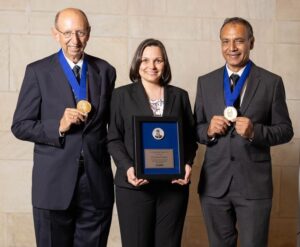Nicole E. Basta, PhD, an infectious disease epidemiologist in the School of Population and Global Health, has been named the 2024 Rising Star by Sabin Vaccine Institute, a global non-profit dedicated to making vaccines more accessible.
“Her groundbreaking research has contributed invaluable insights into the epidemiology of a broad range of infectious diseases, shedding light on the factors that influence disease transmission, the efficacy of vaccination strategies, and patterns of vaccine uptake,” wrote the Institute in its announcement.
The fight against COVID
During the first few months of the COVID-19 pandemic, Basta and fellow McGill professor Erica Moodie, PhD, created a successful COVID-19 vaccine development and approvals tracker, funded by MI4,McGill’s Interdisciplinary Initiative in Infection and Immunity. The online tracker was visited by more than 20 million people from nearly every country in the world.
“We tracked the development of hundreds of COVID-19 vaccine candidates, sorting through the complex information, clinical trials, and data being generated so that we could provide clear, concise, and easily accessible information about the new COVID-19 vaccines,” says Basta. “It was very rewarding to work on a resource that proved to be useful to so many people.”
Basta’s work hours doubled during the pandemic. In addition to her research, she was called upon by media, organizations, colleagues, and loved ones to provide guidance on the latest public health guidelines.
“I became an epidemiologist in order to have a positive impact on the health and well-being of all people,” she says. ”The peak pandemic years are the perfect example of a time when I had the chance to make that difference every minute of every day.”
The next challenge

COVID-19 was not the first pandemic or public health emergency Basta had worked on. She’s conducted research on a wide range of pathogens, including H1N1, HPV, meningococcus, and influenza.
“The common thread is my motivation to better understand the impact of vaccines on the development of immunity and the impact of vaccination programs on population health.”
Her research will continue with the Vaccines, Infectious disease Prevention & Epidemiology Research (VIPER) Group, where she serves as principal investigator.
“All of my work is motivated by the desire to ensure we have the best evidence possible to prevent and control infectious disease threats, and to support healthy communities and individual well-being now and for years to come.
“Despite the significant challenges we face as a global community, I have a lot of hope for the future.”


Dear S/r I have question about prevention of Cholera outbreak in developing counties like Ethiopia, with vaccine.
I knew Cholera has vaccine. How it produced in large scale for African counties?